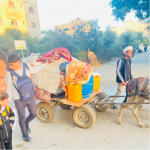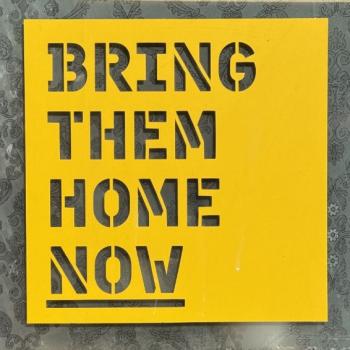Palestinian cuisine is fabulous and bounteous. My mother-in-law, God rest her soul, was a first-rate cook, and I had the privilege of eating her home cooked meals for several years. This is a culture that appreciates good olive oil, fresh herbs, and well-seasoned dishes.
But what to do when you live under constant bombardment, the shops are empty, the fresh produce markets have been reduced to rubble, and there’s no money anyway to buy food if it was available?
Human rights groups are talking about a UN study showing that huge swaths of the population of Gaza are at “crisis” to “catastrophic” levels of food insecurity.
Before the war, about 80% of Gaza’s population relied on humanitarian aid, and a large number were food insecure – so it didn’t take long for the situation to deteriorate even further. Where 150-180 truckloads of food aid used to enter Gaza every day, now it’s more like 30 (thanks to Israel’s brutal policies).
What does this dire situation look like for real-life people?
Our family has lived in the Nuseirat refugee camp for generations. They have a small house with asbestos in the walls and a metal roof. They abandoned their house and went to stay with relatives a few weeks ago when their own neighborhood became too dangerous. There were as many as 20 people at times. Then on Christmas Eve, they got evacuation orders. A few days later they were on the road south. Now they are staying with relatives in Khan Younis.
Through it all, we’ve stayed in contact daily – when the internet worked. I have scrolled through the messages from my niece Horea and nephew Musa, and collected everything they sent me about food in their household.
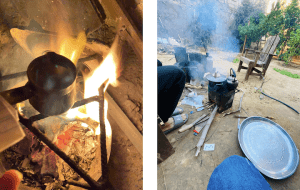
The first 2 photos are from what the family would probably consider “the good old days,” early in the war when there was still coffee (left) and they could gather around a fire outside and cook. They have run out of fuel to cook on the gas stove by this point, so they would gather sticks and make a fire.
October 21 (2 weeks into the war) Musa writes: Everywhere now everybody feels the life we had before, although minimal, was heaven. Because now we see hell.
October 22 I took pix of what happened to the Nuseirat market. What happened there was very painful. Nothing left to recognize, no life, nothing at all. Nothing but memories.
This is what he was referring to: the bombing was covered by Western mainstream media.
This goes without saying, but every bombing hits the neighborhoods, businesses, or infrastructure of actual people. Every bombing results in permanent damage, permanent trauma, to individuals.
October 30 The coffee guy is still making coffee, but with salt water. I didn’t know that.
November 3 (a philosophical moment) Coffee with salt water is patience.
[For a while, we didn’t talk about food.]December 21 (from Horea) After the house ran out of flour, we started eating rice as a substitute for flour, and with the extremely high prices, we could no longer buy rice, so we got wheat grains.
Our neighbor, Umm Yasser, grinds wheat grains for all the women in the neighborhood. She asks us: Do you want them soft? Or coarse? If it is soft, we can make bread from it. But if it is coarse, we make jerisha food [sort of like cream of wheat] from it, and in this way we satisfy our hunger, and we thank God.
December 23 Talking about food and drink has become a tragedy every day. We may find some potatoes, but we do not find bread. We may find some bread, but there are no legumes. There is a severe shortage in all aspects of life. None of us is has enough to eat, but we continue to say, “Praise be to God,” and we pass the time.
Food and drink are not everything. Safety is the most important. We have cats named Mira and Rabhi. They do not eat anything. Their bodies have become worn out.
Today we ate 4 boiled potatoes [12 people]
December 24 Today we ate beans.
December 27 Today we only ate cheese.
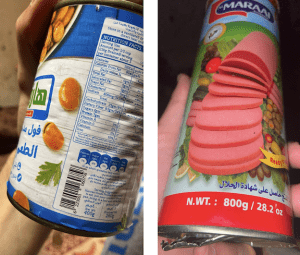 December 28 As for food, we were twenty people eating 260 grams of beans. Each of us was starving, but was satisfied with one bite. [For reference, I checked my cupboard – 260 grams is about the size of a can of Campell’s condensed soup.]
December 28 As for food, we were twenty people eating 260 grams of beans. Each of us was starving, but was satisfied with one bite. [For reference, I checked my cupboard – 260 grams is about the size of a can of Campell’s condensed soup.]
We found a way to send them a little money so they could get more food, and to cover the expense of getting out of Nuseirat when the evacuation notice came. They would be embarrassed by this, but it’s part of being a family, and of course nothing to feel bad about.
One good thing about the evacuation is that Nuseirat had no humanitarian aid, but Khan Younis has some.
December 29 The money has arrived. We were able to buy some canned food and vegetables. Today we ate luncheon meat. We registered yesterday in the shelter schools and will be given aid within five days of submitting the application.
December 30 Coffee here is very, very scarce. The last cup of coffee was a month ago.
December 31 Today we were able to share oranges between us and they tasted so delicious.
January 2 We ate canned peas with some rice, despite its expensiveness. Fruits began to flow into the market through Egypt, but everything is very expensive. We bought three apples for 5 dollars. I hope things will improve as well and more.
January 4 Today, five cans of beans, was distributed to us. Things are a little better, but please talk about displacement. It is very clear that they want to displace us. There is also talk about South Sinai. We will die there and the suffering in any other country will be more difficult. It will be genocide. I hope we will be saved.
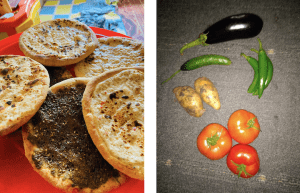 January 5 My mother made manakish. It is made of flour dough, we put cheese or thyme on it and then bake it. It is very tasty.
January 5 My mother made manakish. It is made of flour dough, we put cheese or thyme on it and then bake it. It is very tasty.
Between Rafah and Deir al-Balah, there are six or eight bakeries. You have to imagine. More than two and a half million people have only eight bakeries available. The queue starts at dawn and ends in the evening.
Palestinians rely heavily on pita bread, so bakeries are essential to their life. Israel has destroyed or severely damaged nearly every bakery in Gaza.
Once, a bakery in Nuseirat refugee camp had just received a huge shipment of flour from UNRWA, which would be used to bake half-price bread for the camp residents. As soon as the shipment was unloaded, the bakery was bombed and destroyed.
It goes without saying that when food markets are bombed and supplies are destroyed, people starve. People working or shopping at the markets are killed and injured.
January 7 This is the aid we received (vegetables, above). If a family has less than 7 members, they do not get an eggplant.
And so it goes. No wonder Human Rights Watch (and other organizations) declared,
Starvation Used as Weapon of War in Gaza
Needless to say, this is absolutely unacceptable.
Lots of us support Palestinian rights in our hearts. We pay lip service: “it’s terrible what is happening over there.” That is not enough. Contact the people in Washington DC who (allegedly) work for you and tell them, “ENOUGH. CEASEFIRE NOW. NO MORE WEAPONS TO ISRAEL. STOP THE GENOCIDE. NOW – OR YOU’RE FIRED.”
Reach your Representative here, and your Senator here. Email President Biden here.
I invite you to subscribe to my newsletter. I write about the Palestine-Israel issue regularly, and other issues relevant to progressives or those considering becoming progressive. If you would like to comment on this post, please pop over to my Facebook page. All of my posts are there and open to constructive comment. I welcome your thoughts.
- Follow this refugee family’s quest for survival in Gaza
- The hardest decision our family in Gaza has ever made
- The unexpected one-word message coming out of Gaza today
- Can followers of the Prince of Peace support a group that uses violence?
- Why support for Palestinian resistance is the right response for Christians
- This thought experiment will make you smarter about Gaza and Israel
- A Palestinian Pastor’s powerful message to us: “it’s time to stop praying”
- Christians: Why do we skimp on compassion when it comes to Palestinians?
- Don’t compromise truth on Israel and Palestine
- What People Of Faith Need To Know About Gaza And Israel Right Now
FEATURED IMAGE: Monika Grabkowska via Unsplash


